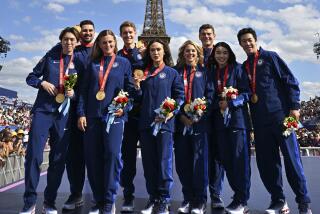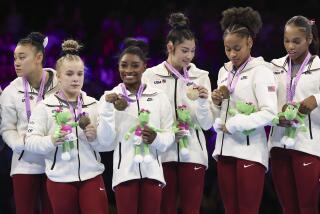Math Quiz Adds Up to U.S.-Soviet Tie for 1st Place
- Share via
WARSAW — The United States won three gold medals and finished in a first-place tie with the Soviet Union in an international competition of the world’s best high school mathematics students, officials announced Monday.
The United States and Soviet Union amassed 203 points each, followed by West Germany with 196 points and China with 177, according to Cecil Rousseau, director of the American team.
The annual competition, called the International Mathematics Olympiad, featured 210 high school students from 37 countries. Each member of each six-man team answered six questions during the competition in Warsaw last Wednesday and Thursday. An international jury graded the results.
The U.S. team was led by gold medalist Joseph Keane, 17, of Pittsburgh, who was awarded a special prize for a “particularly original and elegant solution” to one of the problems on the exam, Rousseau said. He was the only recipient of the award this year.
A Winner from Claremont
David Grabiner, 18, of Claremont, Calif., and Jeremy Kahn, 16, of New York City also won gold medals for the United States.
According to the scoring formula, the students received a maximum of seven points for each of the questions, for a maximum score of 42. The point totals of the individual team members were added to determine the team standings. Medals were awarded to those who scored within point ranges set by the jury.
Students who scored 34 or better received gold medals, 26 or better silver medals and 17 or better bronze medals.
China was the only other team to have three gold medalists.
The Soviet Union won two gold medals and four silvers.
The six young Americans were chosen from among 300,000 students nationwide who took a series of three exams.
“This year’s team was very strong and well balanced,” said Rousseau, a professor of mathematics at Memphis State University. He drilled the U.S. team members in a four-week training course at the Naval Academy at Annapolis, Md., before the competition.
The math olympiad was started among the Soviet Bloc countries in 1959 and later expanded. The United States first entered in 1974 and has finished in first place twice before, in 1977 and 1981, Rousseau said.
All six Americans said that question number 3, which involved algorithms, or repetitive calculations, was the most difficult. The jury awarded Keane the special prize for his handling of that problem.
More to Read
Sign up for Essential California
The most important California stories and recommendations in your inbox every morning.
You may occasionally receive promotional content from the Los Angeles Times.













